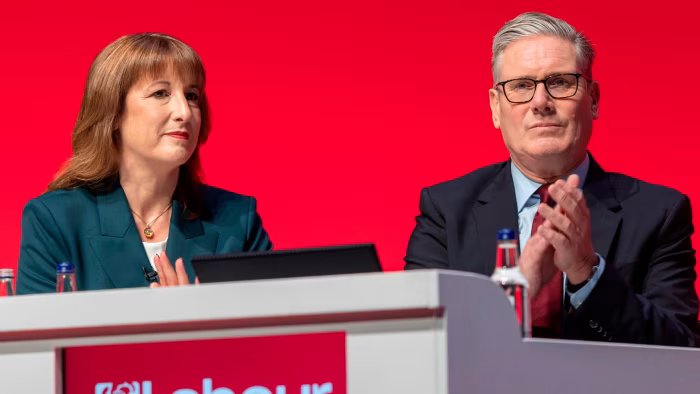Unlock the Editor’s Digest for free
Roula Khalaf, Editor of the FT, selects her favourite stories in this weekly newsletter.
UK government borrowing costs rose sharply on Friday as a shock decision by chancellor Rachel Reeves to ditch a planned income tax rise hit market confidence in her Budget and fuelled a crisis engulfing the Labour administration.
Reeves and Prime Minister Sir Keir Starmer this week decided to rip up the Budget, partly as a result of improved economic forecasts but also because they got cold feet about breaking an election pledge not to raise income tax rates.
One senior government official said: “I won’t deny politics was a factor. But the changing economics meant that the political argument for breaking the manifesto was weaker.
“We went from a position where we absolutely had to put up income tax to a situation where we could close the fiscal gap in another way. Breaking a manifesto is only something you do in extremis.”
The comments supported market suspicions that a weak prime minister is being deterred from taking tough fiscal decisions by a fear of antagonising mutinous Labour MPs and a British public that already dislikes his government.
Gilts sold off despite efforts by government insiders on Friday to signal that the planned increase in income tax rates had been pulled because of more positive fiscal forecasts from the Office for Budget Responsibility.
Ten-year gilt yields, the benchmark for the UK’s long-term borrowing costs, rose 0.14 percentage points to 4.58 per cent, after the Financial Times revealed on Thursday night that the income tax rise planned for the Budget had been ditched.

Instead, Reeves will build a painful fiscal consolidation on a two-year freeze to personal tax thresholds, which analysts think could raise between £8bn and £10bn a year, and a host of other measures.
Friday was the roughest day for the market since an outbreak of speculation around Reeves’ position in early July, and came at the end of a week in which Downing Street itself fuelled speculation that Starmer might face a leadership challenge.
UK borrowing costs have fallen since September as investors priced in a tough tax-raising Budget on November 26 that bolsters the Treasury’s fiscal buffers. The prospect of inflation-fighting measures in the Budget and Bank of England interest rate cuts has also helped to curb yields.
Mike Riddell, a fund manager at Fidelity International, said the market’s expectations had now been overturned. “What has changed is renewed policy and leadership uncertainty,” he added.
Long-term debt was especially hit in the sell-off as investors demanded more compensation for the political turmoil, with the 30-year yield reaching as high as 5.4 per cent.
The market was “led up the garden path” as it counted on the income tax rise to curb borrowing, said John Stopford, head of multi-asset income at asset manager Ninety One.
“Fundamentally, it does not seem as though Starmer and Reeves have got enough control or power in their party to put through difficult decisions,” he added. “It seems very chaotic.”
Starmer’s allies admitted it had been a grim week but insisted that the Budget will ultimately reassure the market with a bigger buffer against the chancellor’s key fiscal rule.
Reeves has promised to fund day-to-day spending — excluding investment — entirely from tax receipts by 2029-30. The Treasury plans to meet that target by a margin of at least £15bn and possibly £20bn, up from the £9.9bn forecast in March.
The decision to ditch plans to raise income tax rates was driven by an improved fiscal outlook from the OBR, the fiscal watchdog, government officials said, citing a stronger outlook for tax revenue and wages.
The OBR submitted its latest private forecast to the chancellor on Monday, the same day Reeves indicated in a BBC interview that she was about to break Labour’s manifesto commitments on tax rises.
However, Paul Johnson, former director of the Institute for Fiscal Studies think-tank, said the government should already have factored in stronger wage growth — a key contributor to the improved OBR forecast — by the end of last month.
The Treasury told the OBR on Wednesday that its “major measures” at the Budget did not include an income tax rise, a day after Number 10 triggered the leadership crisis that threatened to engulf Starmer’s premiership.
Downing Street officials insisted the Budget had not been rewritten to shore up Starmer’s political standing among Labour MPs.
Given the better than expected OBR forecasts, a previously estimated hit to the public finances of up to £30bn is now closer to £20bn, according to the officials.
This means Reeves would need to raise taxes and cut spending by between £25bn and £30bn to rebuild her previous fiscal headroom and top it up further.
People familiar with the matter said Reeves would rely heavily on what has been dubbed the “smorgasbord” approach of increasing a range of taxes, with targets expected to include high-end properties, pension contributions and gambling.
However, Reeves has decided against introducing an expected national insurance levy on individuals who operate through limited liability partnerships, according to people briefed on the situation.
The chancellor has also walked back on proposals for a new exit tax on wealthy Britons relocating to low-tax jurisdictions, the people said.

